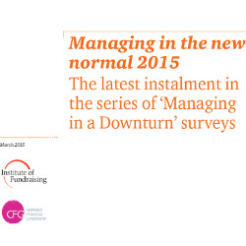Seventy per cent of charities responding to a survey experienced an increase in demand for services in the last 12 months, and the same number expect an increase in the next 12, according to a report released today.
The report, Managing the New Normal 2015, is the latest of a series of reports by Charity Finance Group, Institute of Fundraising and PwC which have been produced annually since 2008 to chart how charities are coping with the recession.
Of the respondents, 28 per cent said that they are not sufficiently resourced to meet rising demand for their services, which was up from 16 per cent in 2014.
Despite this the report found signs of optimism, with 57 per cent of charities reporting rises in staff numbers, and 60 per cent saying staff had high morale.
The report found that charities' top priorities for government are to ensure the sector's sustainability, as well as promote charitable giving.
The survey, which had 400 respondents, suggested that the “cautious optimism” that income is on the increase which was present in respondents to last year’s report had continued into 2015. One of the only income streams not to improve was public sector income, which remained a concern.
Peter Lewis, chief executive of Institute of Fundraising, said the report’s findings “demonstrate the importance of the role of government in creating the right conditions for sustainability of the sector and promoting and encouraging charitable giving”.
Following last year’s report, which found that 80 per cent of respondents had felt the sector had been subject to more scrutiny and media interest, 61 per cent of respondents said they are taking steps to enhance levels of transparency, up from 50 per cent in 2014.
The survey found that 37 per cent of large charities thought that supporting social finance should be the least important priority for the next government, while 18 per cent of large organisations thought it should be a top priority.
Lewis said: “Social investment and better commissioning of public services can deliver resources for some, but nowhere near the scale of what’s needed. The time is right for us to focus now on the wider strategic approach that government needs to play in creating the right conditions for the sector to grow, and a pragmatic and sensible debate about how charities will be able to do more in the next five years.”
Sixteen per cent of large charity respondents also stated that pension challenges should be one of the most important priorities for the next government, compared with nine per cent for medium-sized charities and ten per cent for small.
Caron Bradshaw, chief executive of Charity Finance Group, said in the report that it is clear that more work needs to be done to raise awareness of the pension issues currently being faced.
She said: “The latest financial data indicates that pension deficits in the sector have grown, but the number of organisations identifying this threat to their sustainability continues to be low.”
Bradshaw went on to say that “building a sustainable, resilient and independent charity sector, the kind which this survey indicates charities want to see, is our main challenge for the next five years”.
Ian Oakley Smith, director and head of charities at PwC, said in the report that current perceptions within the sector show further signs of resilience this year as “those within the sector have dusted themselves off, learned from the lessons from downturn and are now looking more outwardly with a sense of optimism. This resilience, developed in recent years, means that charities are now in a stronger position to shape their own future.”









